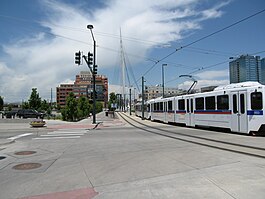FasTracks is a multibillion-dollar public transportation expansion plan under construction in metropolitan Denver, Colorado, United States. Developed by the Regional Transportation District (RTD), the plan consists of new commuter rail, light rail, and express bus services. Six new light rail, electric commuter rail and diesel commuter rail lines with a combined length of 122 miles (196 km) will be constructed under the plan. It expands on previous transportation projects, notably T-REX, and includes 57 new transit stations and stops, 21,000 new parking spaces, 18 miles (29 km) of a bus service between Denver and Boulder and the renovation of Denver Union Station as a multi-modal transportation hub.

The Regional Transportation District, more commonly referred to as RTD, is the regional agency operating public transit services in eight out of the twelve counties in the Denver–Aurora combined statistical area in the U.S. state of Colorado. It operates over a 2,342-square-mile (6,070 km2) area, serving 3.08 million people. RTD was organized in 1969 and is governed by a 15-member, publicly elected Board of Directors. Directors are elected to a four-year term and represent a specific district of about 180,000 constituents.

The D Line is a light rail line which is part of the rail system operated by the Regional Transportation District in the Denver–Aurora Metropolitan Area in Colorado. The D line was the first line in the system when it opened in 1994, traveling from 30th & Downing in Five Points, through downtown Denver, and terminating at I-25 & Broadway as the Central Corridor. It was extended along the Southwest Corridor in July 2000. Because it was the first and only line in the system it had no letter or color designation until the Central Platte Valley Spur opened on April 5, 2002, although on maps it was designated as Route 101.
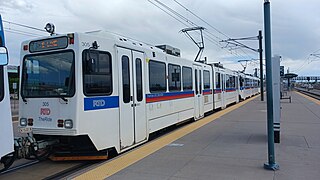
The E Line is a light rail line which is part of the rail system operated by the Regional Transportation District in the Denver metropolitan area in Colorado. The line was added to the system on November 17, 2006, with the completion of the Southeast Corridor as part of the T-REX Project. It is one of four routes that are part of the RTD's service plan for the corridor.

The F Line was a light rail line operated by the Regional Transportation District in the Denver-Aurora Metropolitan Area in Colorado.

The R Line or Aurora Line/I-225 Rail is a Regional Transportation District (RTD) light rail line that serves stations in Aurora, Denver, Greenwood Village, Centennial and Lone Tree. Opening on February 24, 2017, the line was designated as the “R” line, reflecting the letter R’s in “Aurora” and “Ridgegate”.

The H Line, part of the light rail system operated by the Regional Transportation District in the Denver-Aurora Metropolitan Area in Colorado, was added to the system on November 17, 2006, with the completion of the Southeast Corridor project. It is one of four routes that were originally part of the RTD's service plan for the corridor.
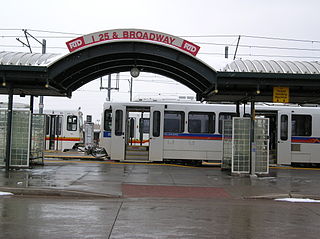
I-25 & Broadway station is a three-platform RTD light rail station in Denver, Colorado, United States. Operating as part of the D, E, and H Lines, the station was opened on October 8, 1994, and is operated by the Regional Transportation District. As the name implies, the station is located at the interchange between Interstate 25 and Broadway in south-central Denver. It is the major transfer point for commuters traveling from Littleton and Englewood on the D Line to the Denver Technological Center on the E Line and Aurora on the H Line.
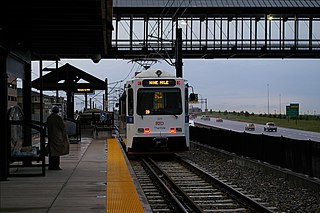
Lincoln station is a light rail station in Lone Tree, Colorado, United States. It is served by the E and R Lines, operated by the Regional Transportation District (RTD), and was opened on November 17, 2006. The station features a public art installation entitled Sun Stream, created by Ray King and dedicated in 2006.

Littleton–Mineral station is a RTD light rail station in Littleton, Colorado, United States. The station was opened on July 14, 2000, and is served by the Regional Transportation District. The station initially saw service on the C Line to Union Station and the D Line to 30th & Downing station. However, the D Line's northern terminus was changed to 18th & California station in January 2018 and the C Line was suspended on January 10, 2021. The C Line would then be permanently eliminated in January 2023. Currently, Mineral station serves as the southern terminus for the D Line. However, RTD plans to extend this line south to Highlands Ranch as a part of the agency's FasTracks expansion plan.

Littleton–Downtown station is a RTD light rail station in Littleton, Colorado, United States. Operation as a light rail station began on July 14, 2000, with both bus and light rail run by the Regional Transportation District. The station initially saw service on the C Line and D Line, however C Line service ended in 2021. Today the station is only served by the D Line.
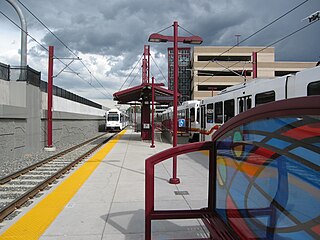
University of Denver station is a light rail station in Denver, Colorado, United States. It is served by the E and H Lines, operated by the Regional Transportation District (RTD), and was opened on November 17, 2006. It serves the University of Denver and is located at the north end of campus on Buchtel Boulevard at High Street across from the Ritchie Center. The station features a public art installation entitled Reflective Discourse, consisting of a series of blue steel panels with cut-out words along the length of the station. It was created by John Goe and dedicated in 2006.
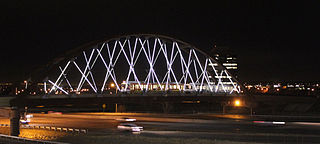
The W Line, also called the West Rail Line, is a light rail line in Denver, Lakewood, and Golden, Colorado, United States. The W Line was the first part of FasTracks to break ground, on May 16, 2007. The line, the only line to traverse the West Corridor, opened for service on Friday, April 26, 2013.

The A Line is a Regional Transportation District (RTD) commuter rail line serving Denver and Aurora, Colorado, operating between downtown Denver and Denver International Airport (DIA). During planning and construction, it was also known as the East Rail Line, but most locals refer to it as the A Line. Despite its former title, the line does not serve the campuses of the University of Colorado.
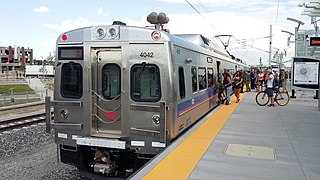
The B Line, also known as the Northwest Rail Line during construction, is a commuter rail line which is part of the commuter and light rail system operated by the Regional Transportation District in the Denver metropolitan area in Colorado. Part of the FasTracks project, the first 6.2-mile (10 km) section from downtown Denver to south Westminster opened on July 25, 2016. If fully built out, estimated around 2042, the B Line will be a 41-mile (66 km) high-capacity route from Denver Union Station to Longmont, passing through North Denver, Adams County, Westminster, Broomfield, Louisville and Boulder.

The G Line, also known as the Gold Line during construction, is a Regional Transportation District (RTD) electric commuter rail line between Denver Union Station and Wheat Ridge, Colorado. Long scheduled to open in October 2016, the opening was delayed until mid-2019. The reason specified for the delay was timing issues experienced by the other commuter rail lines in the RTD system, which currently require a Federal Railroad Administration waiver to operate their grade crossings manually, and the wireless crossing system used by those lines.

The N Line, also known as the North Metro Rail Line during construction, is a commuter rail line which is part of the commuter and light rail system owned by the Regional Transportation District (RTD) in the Denver metropolitan area in Colorado. The first 13 miles (21 km) from downtown Denver to 124th Avenue in Thornton opened as part of the FasTracks expansion plan on September 21, 2020. When fully built out the line will be 18.5 miles (29.8 km) long and pass through Denver, Commerce City, Northglenn, and Thornton. The N Line features Colorado's longest bridge at 9,533 feet called the Skyway Bridge. While other RTD commuter lines are operated by Denver Transit Partners for RTD, this is the only line operated by RTD itself.

25th & Welton station is a RTD light rail station in Denver, Colorado, United States. Originally operating as part of the D Line, the station was opened on October 8, 1994, and is operated by the Regional Transportation District. Located in the Five Points neighborhood, it is the stop closest to the Blair-Caldwell African American Research Library. The January 14, 2018, service changes introduced the L Line, which now serves this station in place of the D Line.

The L Line is a light rail line which is part of the light rail system operated by the Regional Transportation District in the Denver–Aurora Metropolitan Area in Colorado. The L Line opened as part of a service change in 2018 and is formed by a truncated section of the D Line, which formerly served the route.
